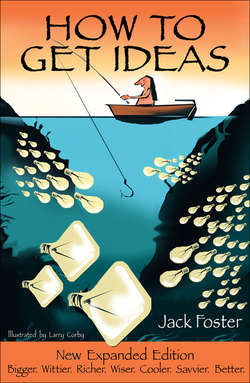How to Get Ideas

Реклама. ООО «ЛитРес», ИНН: 7719571260.
Оглавление
Jack Foster. How to Get Ideas
Preface
Acknowledgments
Introduction
Part I. Ten Ways to idea-Condition Your Mind
1. Have Fun
2. Be More Líke a Chíld
3. Become Idea-Prone
4. Vísualíze Success
5. Rejoíce ín Faílure
6. Get More Inputs
7. Screw Up Your Courage
8. Team Up wíth Energy
9. Rethínk Your Thínkíng
10. Learn How to Combíne
Part II. A Five-Step Method for Producing ideas
11. Defíne the Problem
12. Gather the Information
13. Search for the idea
14. Forget about it
15. Put the idea ínto Actíon
Notes
About the Author
About the Illustrator
About Berrett-Koehler Publíshers
Be Connected
Отрывок из книги
For seven years I helped teach a 16-week class on advertising at the University of Southern California. The class was sponsored by the AAAA – American Association of Advertising Agencies – and was designed to give young people in advertising agencies an overview of the profession they had chosen.
One teacher talked about account management. One teacher talked about media and research. And I talked about creating advertising.
.....
Second, computer systems are doing much of the mundane work you used to do, thereby (in theory at least) freeing you up – and indeed, requiring you – to do the creative work those systems can’t do.
Third, we live in an age so awash with information that at times we feel drowned in it, an age that demands a constant stream of new ideas if it is to reach its potential and realize its destiny.
.....